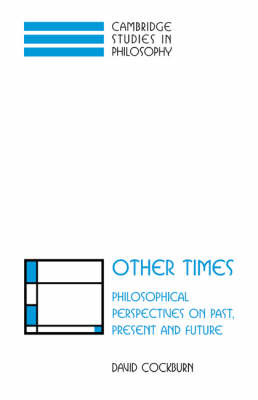
Other Times
Philosophical Perspectives on Past, Present and Future
Seiten
2007
Cambridge University Press (Verlag)
978-0-521-03408-1 (ISBN)
Cambridge University Press (Verlag)
978-0-521-03408-1 (ISBN)
In this interesting and thought-provoking study of issues in the philosophy of time, David Cockburn argues that the notion of 'reasons for emotion' must have a central place in any account of meaning, and that the present should have no priority in our understanding of tense.
We view things from a certain position in time: in our language, thought, feelings and actions, we draw distinctions between what has happened, is happening, and will happen. Frequently, approaches to this feature of our lives - those seen in disputes between tensed and tenseless theories, between realist and anti-realist treatments of past and future, and in accounts of historical knowledge - embody serious misunderstandings of the character of the issues; they misconstrue the relation between metaphysics and ethics, and the way to characterize the kind of sense which tensed language has. David Cockburn argues that the notion of 'reasons for emotion' must have a central place in any account of meaning, and that the present should have no priority in our understanding of tense. This allows for a more satisfactory articulation of the place of past, present and future in our thought, and of the form which criticism of our thought might take.
We view things from a certain position in time: in our language, thought, feelings and actions, we draw distinctions between what has happened, is happening, and will happen. Frequently, approaches to this feature of our lives - those seen in disputes between tensed and tenseless theories, between realist and anti-realist treatments of past and future, and in accounts of historical knowledge - embody serious misunderstandings of the character of the issues; they misconstrue the relation between metaphysics and ethics, and the way to characterize the kind of sense which tensed language has. David Cockburn argues that the notion of 'reasons for emotion' must have a central place in any account of meaning, and that the present should have no priority in our understanding of tense. This allows for a more satisfactory articulation of the place of past, present and future in our thought, and of the form which criticism of our thought might take.
Preface; Acknowledgements; Part I. Time and Tense: 1. Introduction; 2. Under the aspect of eternity; 3. The view from here; 4. Memory, emotions and the past; 5. The role of tense; 6. Tense and ontology; 7. The passage of time; Part II. Past, Present and Future: 8. The present; 9. The reality of the future; 10. Testimony, history and the real past; Part III. Time and Eternity: 11. Time and eternity in Spinoza and Weil; Bibliography; Index.
| Erscheint lt. Verlag | 15.2.2007 |
|---|---|
| Reihe/Serie | Cambridge Studies in Philosophy |
| Zusatzinfo | Worked examples or Exercises |
| Verlagsort | Cambridge |
| Sprache | englisch |
| Maße | 140 x 215 mm |
| Gewicht | 481 g |
| Themenwelt | Geisteswissenschaften ► Philosophie ► Logik |
| ISBN-10 | 0-521-03408-6 / 0521034086 |
| ISBN-13 | 978-0-521-03408-1 / 9780521034081 |
| Zustand | Neuware |
| Haben Sie eine Frage zum Produkt? |
Mehr entdecken
aus dem Bereich
aus dem Bereich
ein Gegenentwurf zum kurzfristigen Denken : so werden wir zu den …
Buch | Hardcover (2023)
REDLINE (Verlag)
CHF 27,90
Buch | Softcover (2023)
De Gruyter (Verlag)
CHF 34,90


